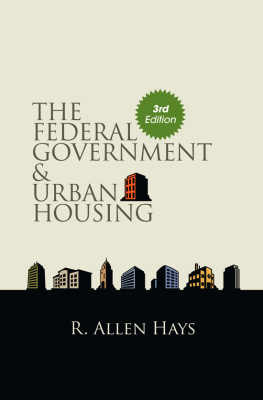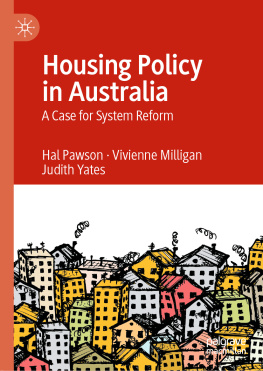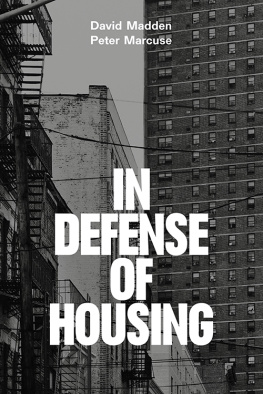
Routledge Revivals
Building Communities the Co-operative Way
This title, first published in 1988, sets the flourishing of housing co-operatives throughout the 1980s in a theoretical and historical framework that suggests that tenant control is the best way out of the still-problematic issue of housing policy.
Before the First World War, co-operative housing was poised to become a potent force in government policy, but instead municipal housing rose to prominence. However, alongside a growing crisis of confidence in state housing and a decline in the private-rented sector, a new political consensus has emerged that has placed co-ops firmly at the top of the agenda. Setting out the argument for collective dweller-control of housing, Birchall demonstrates that the arguments for co-operatives are strong, based on a broad spectrum of political thought. He charts the early and recent history of co-operative housing, and shows how they provide a flexible and stable means of meeting housing needs.
Building Communities the Co-operative Way
Johnston Birchall
Foreword by
Michael Young
First published in 1988
by Routledge & Kegan Paul Ltd
This edition first published in 2014 by Routledge
2 Park Square, Milton Park, Abingdon, Oxon, OX14 4RN
and by Routledge
711 Third Avenue, New York, NY 10017
Routledge is an imprint of the Taylor & Francis Group, an informa business
1988 Johnston Birchall
The right of Johnston Birchall to be identified as author of this work has been asserted by him in accordance with sections 77 and 78 of the Copyright, Designs and Patents Act 1988.
All rights reserved. No part of this book may be reprinted or reproduced or utilised in any form or by any electronic, mechanical, or other means, now known or hereafter invented, including photocopying and recording, or in any information storage or retrieval system, without permission in writing from the publishers.
Publishers Note
The publisher has gone to great lengths to ensure the quality of this reprint but points out that some imperfections in the original copies may be apparent.
Disclaimer
The publisher has made every effort to trace copyright holders and welcomes correspondence from those they have been unable to contact.
ISBN 13: 978-1-138-01662-0 (hbk)
ISBN 13: 978-1-315-78077-1 (ebk)
BUILDING COMMUNITIES THE CO-OPERATIVE WAY
Johnston Birchall
Foreword by
Michael Young
First published in 1988 by
Routledge & Kegan Paul Ltd
11 New Fetter Lane, London EC4P 4EE
Published in the USA by
Routledge & Kegan Paul Inc.
in association with Methuen Inc.
29 West 35th Street, New York, NY 10001
Typeset by Witwell Limited, Liverpool
Printed in Great Britain
by T.J. Press (Padstow) Ltd,
Padstow, Cornwall
Johnston Birchall 1988
No part of this book may be reproduced in any form without permission from the publisher except for the quotation of brief passages in criticism
Library of Congress Cataloging in Publication Date
British Library CIP Data also available
ISBN 0-7102-1143-0
To Libby and Emma
CONTENTS
If Johnston Birchall had been Minister of Housing in 1945 (or still better, in 1919) perhaps Britain would have housed, and re-housed, itself. It is just possible we might have had, not Robert Owens co-operative villages, but Birchalls co-operative urban neighbourhoods. It would have meant, even then, working to some extent against the grain; but even in Britain it might have happened, at any rate on the Swedish scale, which has been grand enough. Co-operative leadership has wrought miracles in Scandinavia. Why not here?
If that question cannot be wholly answered to do so, every wrinkle of our social physiognomy would have to be intently observed at least we know that the changes that have occurred, or been made to occur, have been of the opposite kind. Such damage as Hitler inflicted on British cities has (as we know) been multiplied a hundred times by the politicians, architects, planners and builders who thought they knew better than people themselves what they should want. For every bomb-site not yet filled in and built over there are a hundred obscene tower blocks. Life goes on up there in all its delight. Crane up at the lighted windows at night and behind the unneeded curtains for up there only the angels can see in are sky-people heating the earth-water for their cups of tea. But too many of them have double-bolted their doors. They have been walled in. They are longing for the earth. They are fleeing the city which is no longer friendly to them, or made friendly by them. The housing men have made enemies of citizens. They found a city and left it a battlefield.
The prime casualty has been the working-class community. In 1945 there were tens of thousands of them surviving, vigorously. The urban villages lauded in Abercrombies plan for London he was the prince of planners unheeded by his children were still intact. Fraternity hardly needed to be preached; it was practised. That marvellous vitality which was the tap-root of socialism has been pulverised by the hammer-blows of bureaucracy. The working-class communities have been rehoused in conditions physically a little better and socially a lot worse.
Can we learn from the disaster? Germany and Japan suffered greater disasters. Can Handsworth and Liverpool 8 and Easterhouse and Bethnal Green recover their spiritual lan? If so, housing may again be the key, and, if it happens, the housing co-ops of which Dr Birchall is such a devoted and far-sighted scholar could be a key. For all who want to enable people, to enable them to help themselves without retreating behind the other walls of the acquisitive society, this book could be the key to the key.
ACKNOWLEDGMENTS
It is only when writing acknowledgments that one realises how far back the gestation of a book really goes. The interest in housing co-ops comes from practice as a housing association manager, and some stimulating conversations with my colleagues of that time, David Mumford (chief executive of Copec Housing Trust) and Rod Hackney (community architect and recently elected President of the Royal Institute of British Architects). Then, when writing my doctoral thesis, from which much of the material for the book derives, I incurred a debt also to Harold Campbell, that great pioneer of co-operative housing, to Brian Rose (then Housing Corporation co-ops officer, and since then a colleague on the national committee of the Society for Co-operative Studies) and to so many housing co-op members and associated professionals (about 200 people were interviewed) that it is just not possible to begin to mention them individually. Recently, Simon Underwood (Solon Co-operative Housing Services) and Steve Ross (National Federation of Housing Associations) have helped me to keep up to date with a rapidly changing situation on the ground, Paul Derrick (co-operative writer and enthusiast) has helped with some tricky points of co-operative principle, Malcolm Hornsby (tutor at the Co-operative College) has provided pointers to the forgotten history of co-operative housing in Britain, and Gregory Andrusz some illuminating insights into co-operative housing in the USSR.












